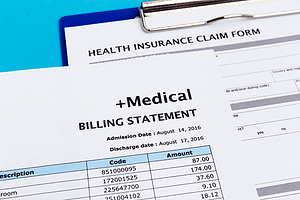Increasing access to affordable health care has been a top priority for Texas 2036.
For many Texans, insurance is unaffordable — to the point of being unobtainable. For others, even those with insurance, the rising costs of care are unsustainable. A lack of hospitals, doctors, and access to care prevents many Texans from receiving the care they need when they need it.
Affordability
Most Texans – with or without insurance – have skipped care due to affordability concerns. According to the Texas Voter Poll, more than a third of Texans – including more than half of Texas mothers – reported that uncertainty about health care prices led them to skip or delay care. Without accurate, real-time pricing information, Texas consumers and employers cannot accurately determine the best value.
Making prices more transparent will reduce a direct barrier to care – uncertainty about costs – and also will enable employers and patients to make intelligent, value-based decisions about where they get care. For too long, health care prices have been unclear until a bill showed up.

Because of these concerns, the state legislature passed three major health care price transparency bills this session: Senate Bill 1137, by Sen. Kolkhorst and Rep. Oliverson; House Bill 2090, by Rep. Burrows and Sen. Hancock; and House Bill 1033, by Rep. Oliverson and Sen. Hancock.
Senate Bill 1137 codifies federal price transparency requirements, ensuring Texas employers and patients know the prices before receiving care. Health care consumers will be able to get real, meaningful prices both on websites, and in a machine-readable format that makes it easier for data aggregators to make comparison shopping easier – similar to how Kayak makes comparison shopping for flights easier.
House Bill 2090 provides similar price transparency requirements on health insurance companies. Insurers will be required to provide – through an app – real-time, provider-specific prices for medical visits and procedures, including the patient’s out-of-pocket costs under the insurance plan. This information will enable Texas consumers to make more informed choices. House Bill 2090 also establishes an all-payer claims database, initially filed by Rep. Walle in House Bill 1907, that, with future improvements, can help inform policymakers and the public on where and how the best value care is being delivered. House Bill 1033, which has already been signed by the Governor, improves prescription drug transparency.
All three bills will work together to ensure that Texas consumers and employers can identify value and do not skip necessary care due to cost-related uncertainty. Texans – especially those with insurance plans regulated by the state – should begin to see how much medical prices vary between providers of the same quality for the same service, and will be able to take action themselves to seek out high-value care.
Other notable affordability victories include House Bill 18, by Rep. Oliverson and Sen. Kolkhorst, which will reduce prescription drug costs for uninsured Texans; and Senate Bill 790, by Sen. Zaffirini and Rep. Howard, which will help reduce instances where Texans receive a surprise bill from ambulances.
Coverage
 Going into the Texas legislative session this year, it was clear that something needed to be done to improve Texas’ uninsured rate, which is the highest in the country with nearly 5 million without insurance, including the highest percentage of uninsured children.
Going into the Texas legislative session this year, it was clear that something needed to be done to improve Texas’ uninsured rate, which is the highest in the country with nearly 5 million without insurance, including the highest percentage of uninsured children.
To support this complex conversation, Texas 2036 brought together experts to develop the Health Coverage Policy Explorer to bring transparent, reliable data into conversations with policymakers, business leaders, health care industry groups, and stakeholders. We also advocated for an all-of-the-above approach to addressing the state’s uninsured population, recognizing that no single policy solution could solve this problem.
The Texas uninsured population roughly groups into four categories: those who are ineligible for Medicaid due to state income restrictions, those who are ineligible for Medicaid or Affordable Care Act benefits due to federal income limitations, children who are ineligible but not participating in government programs, and adults who can receive subsidized insurance but do not participate. At Texas 2036 we pursued and achieved victories for each of these groups.
Among Medicaid populations, two significant bills passed to increase coverage: House Bill 133, by Rep. Rose and Sen. Kolkhorst, and House Bill 2658, by Rep. Frank and Sen. Kolkhorst.
House Bill 133 extended postpartum Medicaid coverage from two to six months. House Bill 2658 was amended to include House Bill 290, by Rep. Cortez, which will reduce the number of eligible Texas children improperly removed from Medicaid by improving a flawed eligibility process. Combined, these two bills could help tens of thousands of Texas mothers or children remain covered by Medicaid at critical times in their lives.
For uninsured Texans seeking affordable coverage on the Affordable Care Act marketplace, Senate Bill 1296, by Sen. Johnson and Rep. Oliverson, will create a process that provides for the Texas Department of Insurance to reduce net premiums paid by Texans. Our studies estimate that roughly 200,000 Texans will gain affordable health insurance as a result.
For the remaining uninsured Texas populations, the legislature passed two bills that will authorize new coverage options: House Bill 3924, by Rep. Oliverson and Sen. Springer, and House Bill 3752, by Rep. Frank and Sen. Hancock. These two bills allow the Texas Farm Bureau and Texas Mutual to offer alternative health benefit plans, which will primarily benefit individuals who otherwise are priced out of current market options.
Despite these successes, there’s still more than can be done – especially for Texans who fall into the Medicaid coverage gap. Texas 2036 advocated for the adoption of a “Texas Medicaid Improvement Plan,” which would have maximized federal funding sources to extend Medicaid coverage to 700,000 Texans (or those up to 138% of the federal poverty level) while actually saving the state money.
While the Texas legislature chose not to adopt the Texas Plan this regular session and is expected to continue to study and evaluate options in advance of the 1115 hospital funding waiver expiration in September 2022, these conversations significantly advanced the discussion about the inaccessibility of insurance in Texas and led to other new coverage policy options that sought to move the needle for Texans.
Access
 The third key area of health care policy – access – had a couple of wins for Texans, too. With dozens of rural hospital closures in recent years and many communities lacking primary care providers, technology-driven health access options, like telemedicine, offer ways to get necessary care to people in every part of our vast state.
The third key area of health care policy – access – had a couple of wins for Texans, too. With dozens of rural hospital closures in recent years and many communities lacking primary care providers, technology-driven health access options, like telemedicine, offer ways to get necessary care to people in every part of our vast state.
House Bill 4, by Rep. Price and Sen. Buckingham, makes permanent many of the emergency rules put in place during the pandemic that removed bureaucratic barriers and red tape that impeded telehealth access and utilization.
This legislative effort was led by members of the Digital Texas coalition. Launched late last year by Texas 2036, the Texas Rural Funders, and the Greater Houston Partnership, Digital Texas now has more than 40 members, which will continue to work towards the implementation of a broadband plan.
Further, House Bill 1616, by Rep. Bonnen and Sen. Huffman, creates an expedited pathway to licensure for physicians wishing to practice in multiple states via the Interstate Medical Licensure Compact. This is intended to increase the supply of doctors available to provide services to Texans, both by easing barriers to relocation and by eliminating potential barriers to offering telemedicine access.
Texas 2036 is proud to have supported these bills – together, they represent a critical first step. But there’s far more work to do. In the months ahead, Texas 2036 will continue working to identify policies and strategies to ensure that all Texans can get affordable health care they need when they need it.
